Chances are your veterinarian has asked to take your dog to “the back” at one time or another. While having your beloved pup out of your sight is understandably stressful, there are several legitimate reasons your vet may choose to do this – and none of them are as scary as you may think!
I worked as a veterinary technician for more than 15 years. In my experience, tending to a pet without the owner present is often safer and less traumatic for everyone involved, including your dog.
What is “The Back”?
The exam rooms in a veterinary clinic typically open onto a large treatment area casually referred to as “the back.” This space contains treatment tables stocked with the tools of the trade, a pharmacy, and computers for keying in services. Most importantly, this area contains veterinary technicians and assistants – a.k.a. help!
No matter how well behaved the dog, certain veterinary procedures require an additional set of hands. While many owners are willing to hold their pets, they aren’t trained to do so properly, and their efforts can end up causing more harm than good.
“Your pet may actually be much more difficult (or even dangerous) to handle in your presence, either because he’s trying to protect you or is sensing your concern for him,” writes Dr. Ernie Becker. “For many pets, getting away from Mom or Dad and being handled by a confident, experienced, animal-loving veterinary technician means getting the procedure done faster and with less stress for everyone.”
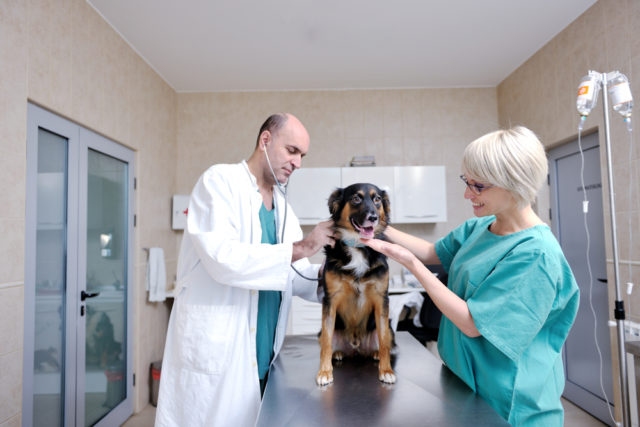
Taking a dog to “the back” improves safety & reduces stress –
For your dog:
Your dog loves you and can sense when you are feeling anxious. When your blood pressure begins to rise at the sight of a vaccine needle or a tube of blood, so does your dog’s. In addition to the transfer of nervous energy, many dogs are protective of their owners.
The frightening sights, sounds and smells of a veterinary office coupled with your nervous energy awaken your dog’s fight-or-flight response. Removing them from that situation often helps alleviate their stress.
“Some pets are actually calmer when they are away from their owners, which makes it easier to perform exams or draw blood or administer a treatment,” writes Dr. Joanne Intile. “This allows the veterinarian to accomplish tasks more efficiently and safely, reducing stress for the pets.”
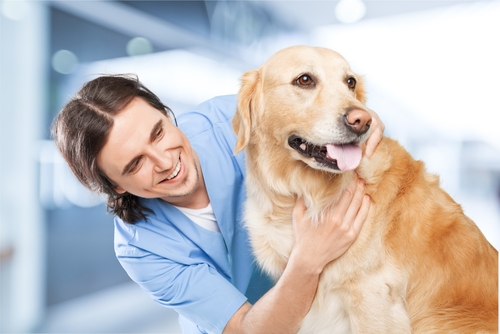
For you:
You may think you want to witness every treatment the veterinary staff performs on your dog, but depending on the problem, you could be wrong. Vets deal with lots of gross stuff – blood, infected absesses, anal gland excretions, and much more. If you have a sensitive gag reflex, trust the staff when they recommend taking your dog to “the back”!
Dr. Patty Khuly wrote about the unfortunate phenomenon of clients fainting during veterinary procedures:
“It’s my experience that you never know who’s going to pass out, which is why it’s not a good idea to attempt anything gross or smelly in front of any client without describing what you’re about to do first.”
Not only are certain veterinary treatments gross, they can also be uncomfortable for your dog. The animal lovers at your vet’s office do their best to minimize pain, but sometimes it is unavoidable. Bringing your dog to “the back” prevents you from having to see him struggle or hear him cry.
For the staff:
Veterinarians and their staff draw blood, give injections, and insert I.V. catheters on a daily basis. However, these procedures become twice as difficult when an anxious owner is looking over their shoulder. When it comes to your dog’s health, you want his caretakers to be calm, cool and collected. Allowing them to take your dog to “the back” helps relieve some of the pressure their high-stress job entails.
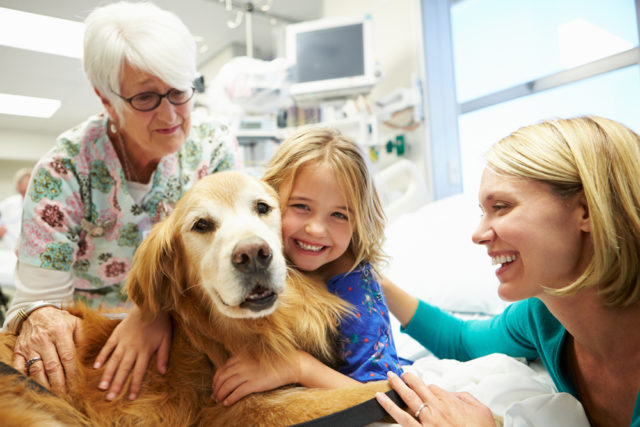
“The back” provides the staff with more room to work.
The treatment area of most animal hospitals is open and spacious with plenty of room to maneuver. Quite the opposite, exam rooms tend to be small and cramped. This is especially true if the entire family has come along for the appointment. Loved ones are always welcome, but the more people, the less space the staff have to do their job.
Dr. Intile also notes that the close quarters in the exam room can make it difficult to focus on the task at hand.
“The back is often a bustling location in a vet hospital, but when necessary, can also be transformed into one of the quietest areas,” she writes. “It’s an excellent place to listen for heart murmurs or abnormal breath sounds without worrying whether an owner will try to talk or ask questions during the procedure.”
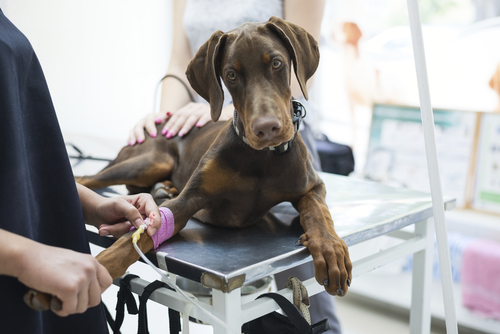
In “the back,” the staff have access to necessary equipment.
In the case of a veterinary emergency, the staff need life-saving equipment right at their fingertips. The tables in the treatment area are typically stocked with clippers, bandaging materials, I.V. catheters, etc.
This is also where the supplies they need to address routine complaints like ear infections are kept.
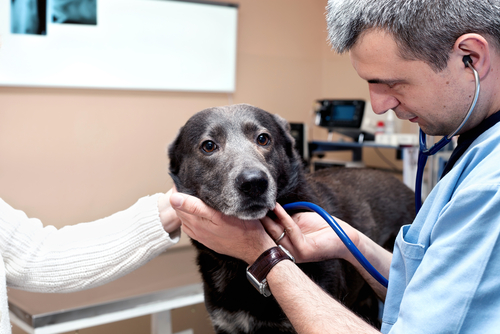
You should never feel anxious about what happens when your dog is alone with the staff. Some pet parents find that a tour of the clinic’s treatment area helps put their mind at ease. If being separated from your dog is a sticking point, schedule a consultation with your vet to discuss your concerns.
Do you want a healthier & happier dog? Join our email list & we’ll donate 1 meal to a shelter dog in need!
Be the first to comment